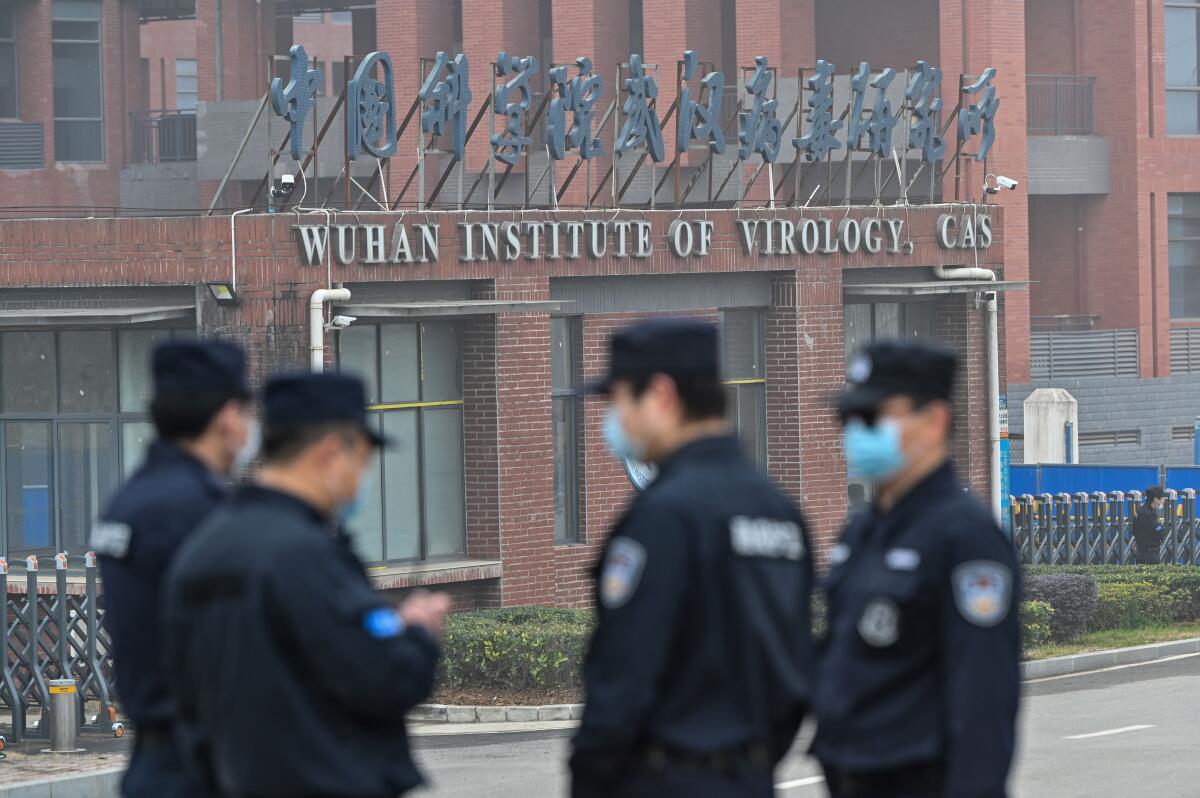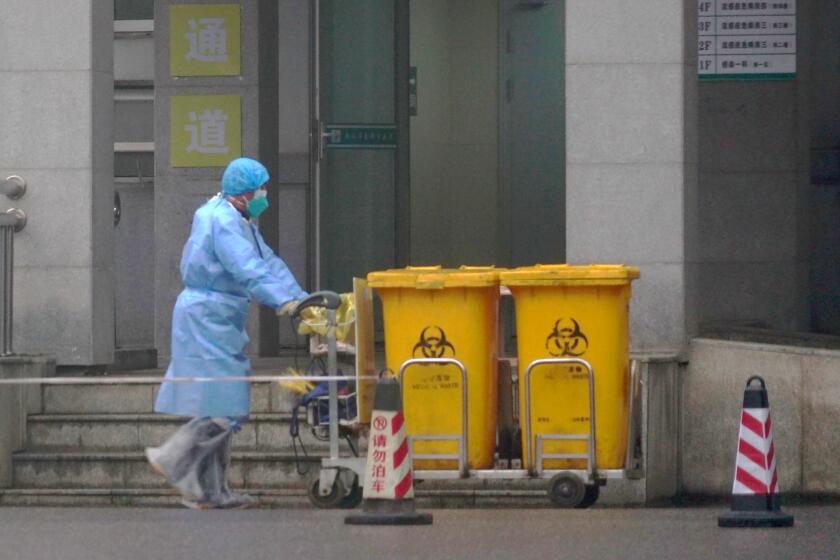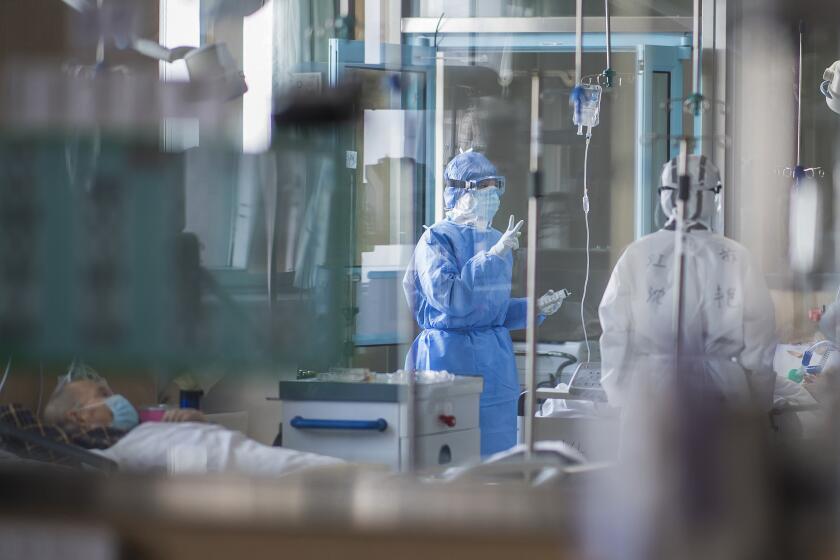COVID-19 pandemic most likely began with a lab leak, U.S. Department of Energy says

A crucial question has eluded governments and health agencies around the world since the COVID-19 pandemic began: Did the virus originate in animals or leak from a Chinese lab?
Now, the U.S. Department of Energy has assessed with âlow confidenceâ that it began with a lab leak, according to a person familiar with the report who wasnât authorized to discuss it. The report has not been made public.
But others in the U.S. intelligence community disagree.
âThere is not a consensus right now in the U.S. government about exactly how COVID started,â John F. Kirby, the spokesman for the National Security Council, said Monday. âThere is just not an intelligence community consensus.â
The DOEâs conclusion was first reported over the weekend in the Wall Street Journal, which said the classified report was based on new intelligence and noted in an update to a 2021 document. The DOE oversees a national network of labs.
White House officials on Monday declined to confirm press reports about the assessment.
In 2021, officials released an intelligence report summary that said four members of the U.S. intelligence community believed with low confidence that the virus was first transmitted from an animal to a human, and a fifth believed with moderate confidence that the first human infection was linked to a lab.
While some scientists are open to the lab-leak theory, others continue to believe the virus came from animals, mutated, and jumped to people â as has happened in the past with viruses. Experts say the true origin of the pandemic may not be known for many years â if ever.
A close analysis of Wuhanâs earliest COVID-19 cases points to a live-animal market as the most likely source of the novel coronavirus, a study argues.
The U.S. Office of the Director of National Intelligence declined to comment on the report. All 18 offices of the U.S. intelligence community had access to the information the DOE used in reaching its assessment.
Scientists at the Wuhan Institute of Virology in China and their collaborators in the United States had been studying coronaviruses for years, in part because of widespread concerns â tracing back to the 2003 SARS outbreak â that coronaviruses could be the source of the next pandemic.
No intelligence agency has said they believe the coronavirus that causes COVID-19 was released intentionally. The unclassified 2021 summary was clear on this point, saying: âWe judge the virus was not developed as a biological weapon.â
âLab accidents happen at a surprising frequency. A lot of people donât really hear about lab accidents because theyâre not talked about publicly,â said Alina Chan, a molecular biologist at the Broad Institute of MIT and Harvard who co-authored a book about the search for COVID-19 origins. Such accidents âunderscore a need to make work with highly dangerous pathogens more transparent and more accountable.â
Last year, the World Health Organization recommended a deeper probe into a possible lab accident.
China has called the suggestion that COVID-19 came from a Chinese laboratory â baseless.â
Many scientists believe the animal-to-human theory of the coronavirus remains much more plausible. They theorize it emerged in the wild and jumped from bats to humans, either directly or through another animal.
Two new studies build on evidence that the coronavirus that causes COVID-19 jumped to humans in a Wuhan market, and did so twice.
In a 2021 research paper in the journal Cell, scientists said the COVID-19 virus is the ninth documented coronavirus to infect humans â and all the previous ones originated in animals.
Two studies published last year by the journal Science bolstered the animal origin theory. That research found that the Huanan Seafood Wholesale Market in Wuhan was likely the early epicenter. Scientists concluded that the virus likely spilled from animals into people two separate times.
âThe scientific literature contains essentially nothing but original research articles that support a natural origin of this virus pandemic,â said Michael Worobey, an evolutionary biologist at the University of Arizona who has extensively studied COVID-19â˛s origins.
He said the fact that others in the intelligence community looked at the same information as the DOE and âit apparently didnât move the needle speaks volumes.â He said he takes such intelligence assessments with a grain of salt because he doesnât think the people making them âhave the scientific expertise ... to really understand the most important evidence that they need to understand.â
The U.S. should be more transparent and release the new intelligence that apparently swayed the DOE, Worobey said.
A timeline of COVID-19âs early weeks in China, beginning with the emergence of the first patient on or around Nov. 18.
The DOE conclusion comes to light as House Republicans have been using their new majority power to investigate all aspects of the pandemic, including the origin, as well as what they contend were officialsâ efforts to conceal the fact that it leaked from a lab in Wuhan. Earlier this month, Republicans sent letters to Dr. Anthony Fauci, National Intelligence Director Avril Haines, Health Secretary Xavier Becerra and others as part of their investigative efforts.
The now-retired Fauci, who served as the countryâs top infectious disease expert under both Republican and Democratic presidents, has called the GOP criticism nonsense.
Rep. Michael McCaul (R-Texas), chairman of the House Foreign Affairs Committee, has asked the Biden administration to provide Congress with âa full and thoroughâ briefing on the report and the evidence behind it.
Kirby, the National Security Council spokesman, emphasized that President Biden believes itâs important to know what happened âso we can better prevent future pandemicsâ but that such research âmust be done in a safe and secure manner and as transparent as possible to the rest of the world.â
Ungar reported from Louisville, Ky. AP reporters Farnoush Amiri, Nomaan Merchant and Seung Min Kim contributed to this report.









